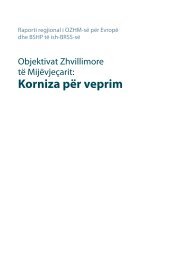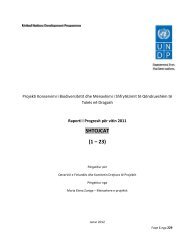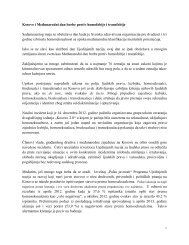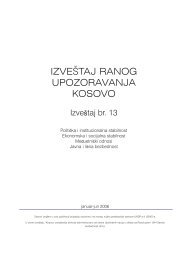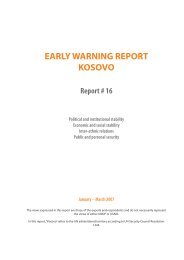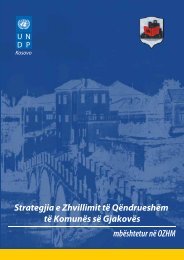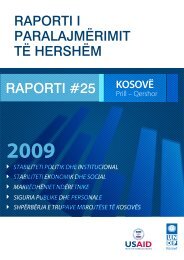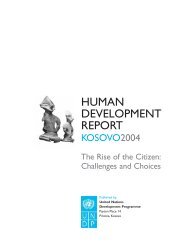Kosovo Human Development Report 2010 - UNDP Kosovo - United ...
Kosovo Human Development Report 2010 - UNDP Kosovo - United ...
Kosovo Human Development Report 2010 - UNDP Kosovo - United ...
Create successful ePaper yourself
Turn your PDF publications into a flip-book with our unique Google optimized e-Paper software.
• Equip teachers with inclusionsensitive<br />
skills: teachers can make<br />
all the difference when it comes to<br />
encouraging attendance and preventing<br />
drop-out rates. <strong>Kosovo</strong>’s<br />
teachers need to be equipped to<br />
support socially excluded groups<br />
in classrooms. Since 2000, many local<br />
and international organisations<br />
and institutions such as the <strong>United</strong><br />
Nations Children’s Fund (UNICEF),<br />
the <strong>Kosovo</strong> Educator <strong>Development</strong><br />
Program (KEDP), Finnish Support<br />
to the <strong>Development</strong> of Education<br />
Sector in <strong>Kosovo</strong> (FSDEK), and the<br />
<strong>Kosovo</strong> Education Center (KEC)<br />
have supported MEST to provide<br />
training programmes for Kosovan<br />
teachers, including trainings on<br />
inclusion. It has become urgent<br />
now that this knowledge and new<br />
methodologies are applied in practice.<br />
• Strengthen capacities at the municipal<br />
level when implementing<br />
decentralization: concerted<br />
action must be taken to build<br />
management capacities in schools,<br />
and strengthen linkages between<br />
schools and communities (through<br />
NGOs and other parent-teacher<br />
style associations). Implementation<br />
of the Law on Education is<br />
hampered at the local level by the<br />
lack of adequate financial and administrative<br />
capacities in the municipal<br />
education directorates under a<br />
newly decentralized system. 116 Decentralization<br />
can improve resource<br />
allocation and services provision by<br />
bringing decision makers and service<br />
providers closer to residents.<br />
It can also lead to a higher level of<br />
responsiveness and customization<br />
where local public servants develop<br />
and implement unique solutions<br />
to specific local problems.<br />
The decentralization of education<br />
management can provide a posi-<br />
64 | KOSOVO HUMAN DEVELOPMENT REPORT <strong>2010</strong><br />
tive opportunity for an increased<br />
role of the community in remedying<br />
issues of social exclusion in<br />
the school system. However, the<br />
realization of these opportunities<br />
depends entirely on institutional<br />
capacity on the ground, and interlinkages<br />
with communities.<br />
(ii) Promote and prioritize education<br />
among those unlikely to be included<br />
• Develop financial and cultural<br />
incentives for education among<br />
the poor, families with disabled<br />
children and RAE communities –<br />
focusing on girls: <strong>Kosovo</strong>’s young<br />
excluded students require a comprehensive<br />
social mobilization strategy,<br />
backed by financing, to open their<br />
access to schooling. The financial<br />
and cultural barriers experienced<br />
by poor, disabled and minority children<br />
cannot be overcome outside<br />
the context of their communities<br />
and families. However, promotion<br />
of education in principle, without<br />
solutions to pressing issues of family<br />
poverty, the high price of transport,<br />
the need for children to supplement<br />
incomes etc., may also be<br />
ineffective. Special strategies are<br />
needed to encourage the attendance<br />
and retention of rural girls<br />
who, as a group, are the least likely<br />
to receive a quality education. In<br />
addition to widespread community<br />
behaviour-change strategies,<br />
policy options for financial support<br />
include providing allocations<br />
for targeted forms of student support<br />
such as scholarships and subsidies<br />
on canteen meals and living<br />
allowances. To raise additional<br />
revenues to cover these targeted<br />
programmes, schools may charge<br />
for elective studies and extra-curricular<br />
activities.<br />
• Encourage early childhood learning<br />
institutionally and culturally:<br />
<strong>Kosovo</strong> must instill a culture of early



